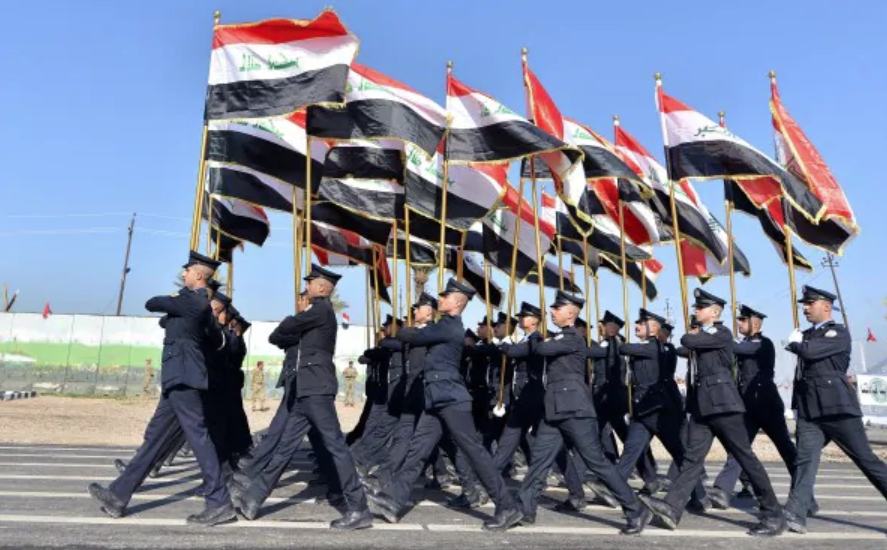BAGHDAD —Iraq’s stability rests on revitalizing its energy sector and weaning itself off natural gas imports, Energy Secretary Rick Perry said Tuesday during a rare visit by a member of President Trump’s Cabinet as Washington seeks to weaken Iraq’s ties to Iran.
Iraq faces a difficult challenge in balancing its allegiances to both the United States and Iran. Iranian natural gas plants account for nearly 50 percent of Iraq’s electricity, an arrangement that is threatened by new U.S. sanctions on Iran’s energy, banking and transportation sectors.
In addition to the two countries’ cultural, military and political ties, Iraq has been a critical trading partner for Tehran at a time when sanctions have contributed to a deepening economic crisis in Iran.
Perry said he discussed sanctions on Iranian oil exports with Iraqi officials but did not address whether the United States will extend a 45-day waiver granted to Iraq last month as it seeks other energy sources.
“Sanctions were mentioned. They are a reality; they are there,” he said.
Perry said U.S. companies are ready to partner with Iraq to rebuild an energy infrastructure destroyed by a nearly four-year war against the Islamic State militant group and to help develop the country’s natural gas resources to serve energy-starved Iraqis.
But Perry stopped short of pledging U.S. taxpayer money toward the effort, urging Iraq’s leaders instead to rush new policies that would significantly reduce the red tape for foreign investment and rein in rampant corruption.
“I think it’s important for you to increase your energy diversity, your energy security, your national security while at the same time reducing your dependence on less-reliable countries seeking domination, control, using that energy resource,” Perry said in an apparent reference to Iran during an event organized by the U.S. Chamber of Commerce. The conference was attended by representatives of 52 companies and Iraq’s ministers of oil and electricity.
“The U.S. is well prepared to be a transparent, competitive and reliable source of [liquefied natural gas] to Iraq,” he added.
Iraq has struggled to keep the lights on since the U.S.-led invasion in 2003, with major cities such as Baghdad still without round-the-clock electricity.
Over the summer, widespread protests roiled Iraq’s southern Shiite heartland over the lack of basic services such as electricity and clean water, again highlighting the government’s inability to improve living conditions for the majority of Iraqis amid a security and economic crisis.
The protests dealt a fatal blow to pro-U.S. prime minister Haider al-Abadi’s bid for a second term in May elections.
His successor, Adel Abdul Mahdi, has struggled to complete his cabinet amid political infighting, but his choices for ministers of oil and electricity were approved with near-
unanimous support from parliament — sending positive signals that Iraq sees its energy crisis as an urgent priority.
“This is a different administration that will move with speed to develop an energy sector that best serves the citizens of Iraq,” Perry said after meeting with Oil Minister Thamer Ghadban and Electricity Minister Luay al-Khatteeb.
Perry’s visit was the first by a member of Trump’s Cabinet this year and only the second since the president took office. Defense Secretary Jim Mattis visited Iraq in 2017 as major combat against the Islamic State wound down.
In his remarks, the former governor of Texas hewed to a U.S. policy shaped by Trump’s worldview: The United States will not directly fund the rebuilding of Iraqi cities destroyed by the U.S.-backed campaign to defeat the Islamic State and will instead focus on encouraging U.S. companies and nations elsewhere in the Middle East to do so — while pressuring Iraq’s government to ease the arduous processes of doing business in Iraq.
“Capital will come where it is welcome,” Perry said. “America and its business community stand ready to help you.”
“American innovation” can help restore Iraq’s electric grid, increase its crude oil exports, develop its natural gas reserves and rebuild its sagging infrastructure, Perry said, adding that his visit is proof that Iraq’s security environment has improved dramatically.
Douglas Ollivant, a managing partner of Mantid International, which works with U.S. companies in Iraq, said Perry’s visit was “an important symbolic appearance by the administration, reminding that Washington has not forgotten Baghdad.”
“It’s also very important that he was carrying a message of making Iraq more business-friendly,” Ollivant added.
Perry arrived the day after Iraqis observed the first anniversary of the nation’s declaration of victory over the Islamic State.
The occasion was marked by spontaneous street celebrations and military marches — and the limited opening of Baghdad’s Green Zone, a heavily fortified slice of the city that houses the sprawling U.S. Embassy, international diplomatic missions, government ministries and villas belonging to Iraq’s business and political elites.
The Green Zone has been closed to the public since 2003, when the U.S. invasion turned it into the cloistered administrative center of the occupation. It later became a symbol of the Iraqi government’s perceived detachment from the needs and concerns of the general public.
Abdul Mahdi ordered one of the wide boulevards of the Green Zone opened for a two-week trial starting Monday, from 5 p.m. to 10 p.m. — a move that he said could become permanent, despite objections from the United States. Other arteries and the leafy side streets of the area remain closed.
The U.S. Embassy responded to the limited opening of the area by restricting all American staffers from taking walks beyond the embassy gates, said a person familiar with the order who spoke on the condition of anonymity because the person was not authorized to speak with the media.

